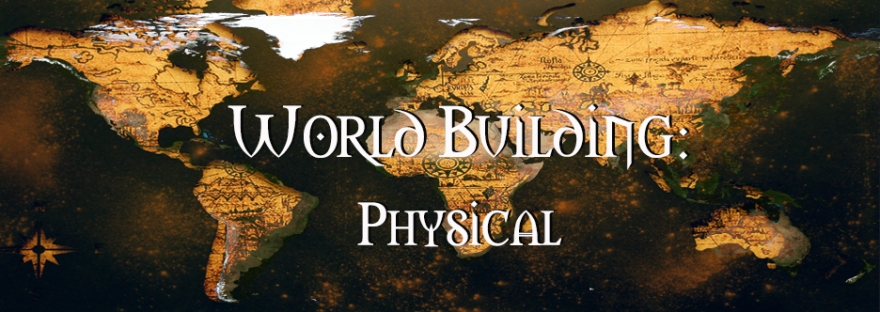
I am a Sci-Fi/Fantasy writer and as such, world building comes with the territory. Even if the project I am working on is based in the real world, inevitably, there will be at least one element to set it apart.
 It could be something simple like a mirror that takes you into parallel realities (why yes, that is my premise for The Eternity Mirrors, a shameless plug I know), or it could be as elaborate as creating an entirely new realm, planet, or galaxy for my characters to inhabit.
It could be something simple like a mirror that takes you into parallel realities (why yes, that is my premise for The Eternity Mirrors, a shameless plug I know), or it could be as elaborate as creating an entirely new realm, planet, or galaxy for my characters to inhabit.
Whatever setting you may envisage for your story, you will want to make sure it is relatable and tangible for your readers. To do this, there are three elements that I would suggest you consider:
- The Physical World
- The Human World
- The Extraordinary World
I’m not suggesting that you will have to have exhaustive notes and research on all of these for every story you come up with (I certainly don’t). It may be that a lot of the decision-making about your world is done unconsciously. But the whole point behind this series, Turning Ideas Into Words, is to get you thinking about your own process and finding what works for you. The more you can bring to the surface things that you would usually do without thinking out loud, the better equipped you will be for times when writing feels like an uphill struggle in concrete boots.
This week, I’m going to be focusing on the physical world-building.
The Physical World
This is going to be the blank canvas upon which everything else will take shape. If you plan on creating a world that bares little resemblance to our own, it is useful to start off with things that will ground everything else (no pun intended).
In the same breath, though, you can probably skip this bit if your story takes place in the real world. After all, you only have to look out of the window or Google a few exotic locations to get a handle on how our own world ‘works’.
But for an entirely fantastical world, you may want to take a few minutes to think things through.
Climate
 You may not think that the weather is the most riveting of subjects. But let’s not forget the importance of Pathetic Fallacy in literature. For those who have successfully repressed their GCSE coursework on Wuthering Heights, Pathetic Fallacy is the device wherein human emotions are attributed to nature or inanimate objects. It is usually applied in a specific scene to emphasise what the characters are feeling/experiencing. Think of the storm that rages the night that Cathy and Heathcliff row, and Heathcliff then takes off for a few years.
You may not think that the weather is the most riveting of subjects. But let’s not forget the importance of Pathetic Fallacy in literature. For those who have successfully repressed their GCSE coursework on Wuthering Heights, Pathetic Fallacy is the device wherein human emotions are attributed to nature or inanimate objects. It is usually applied in a specific scene to emphasise what the characters are feeling/experiencing. Think of the storm that rages the night that Cathy and Heathcliff row, and Heathcliff then takes off for a few years.
But more than just clouding things over when your characters are sad, the climate of your world may have an effect on your characters’ cultural identity as well.
Take me as an example. I am British. As such, I can tell you over forty different ways to describe rain. And that’s just off the top of my head, there are many others I haven’t thought of.
Don’t believe me? Check out the list at the end of this post…
 Why do we Brits talk about rain so much? Because in Britain it rains. A LOT. And the English language has never been content to have just one word to cover a single phenomenon. There is one for every kind of rain you could possibly encounter.
Why do we Brits talk about rain so much? Because in Britain it rains. A LOT. And the English language has never been content to have just one word to cover a single phenomenon. There is one for every kind of rain you could possibly encounter.
My point is that if I lived in a dry climate (the Sahara desert, for instance), I may not have such a varied vocabulary or appreciation for rain (but I may be able to talk to you about forty different types of sand instead).
Geography
So, this was never my favourite subject at school, but having said that, your world’s landscape can have as much of an impact on your characters as the weather.

One of the story ideas I have on the back burner at the moment is set across five planets (yes, that’s essentially five worlds to build for one project – why do I do this to myself?!) One of these five planets, Dana, is uninhabitable on the surface thanks to lots of toxic gases in the atmosphere. As a result, all of the living quarters and cities are dug into tunnels and in great big cavernous spaces below the planet’s surface. There is no natural sunlight on the planet, which means that there are no time zones on Dana (only DST – Dana Standard Time). The days are governed entirely by artificial light and are not dependent on where/when the sun rises and sets on the surface. As you may imagine, there are not a lot of tanned people on Dana (unless they happen to be rich enough to live on one of Dana’s lush moons and they simply commute to the planet each day for work).
By making just a few decisions about the planet’s climate and geography, the society on Dana is already significantly altered from one that is based on an Earth-like planet.
Once you have the groundwork of your world in place, there are a couple of other aspects you may want to consider as well:
- Time Period/Setting: Just briefly, if you do stay Earth-bound, setting your story in the past or future will have a significant bearing on many other aspects: technology, speech patterns, clothing, education levels, religious/mythological heritage. A lot of these aspects will be looked at next time when I explore the human world that you may be building to inhabit the physical world, but do keep them in mind as you build your physical world.

- Maps: If you really want to go to town on this, why not draw up a map of your world. I’m sure you can think of a hundred different fantasy novels that include a map in the book’s cover. If your story includes an epic quest across a wide and varied landscape, a map can help readers to orient themselves as the characters move through the world.
As I mentioned above, you may not need to sit down and make copious notes about the world your story is based in, but odds are at some point, they will bleed into what you are writing.
If you are a Planner like me, working out the physical lay of your made-up land can help you to think about who would live in such a place. More on that next time.
Words/Phrases to describe and talk about Rain
Rain; Precipitation; Drizzle; Mizzle; Mist; Sea Fret; Haar; Monsoon; Deluge; Downpour; Bucketing down; Torrent; Shower; Sprinkle; Cloudburst; Flurry; Drencher; Squall; Tempest; Hurley burley; Scotch mist; Liquid sunshine; The Heavens opened; Raining cats and dogs; Raining sideways; Good weather for ducks; Dreich; Plothering; Spitting; Stotting; Stair rods; Hammering down; Tipping down; Lashing; Pelting; Pattering; Driving; Hoying it down; Spluttering; Coming down in sheets; Beating down; Drumming down; Peeing down; Pissing down.
You’re welcome, world!

Loved all the ways to say raining. I have one to add to your list. When my husband (then boyfriend) was studying abroad in Wales, there was a this rain that was more than spitting, but less than misting. We dubbed it Welshing! You don’t need an umbrella, but you get drenched just the same.
LikeLike
I used to live in Wales, and other know exactly the type of rain you mean! A friend of mine used to called it “Mwaha Rain,” as in “Mwahaha, you will get soaked and there is nothing you can do about it!” It’s horrible!!
LikeLiked by 1 person